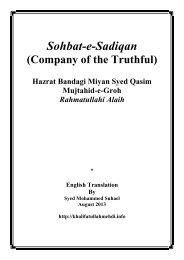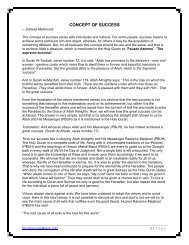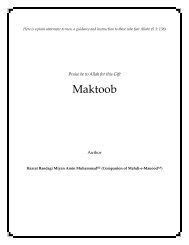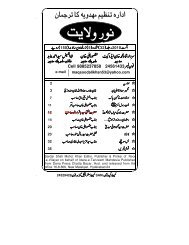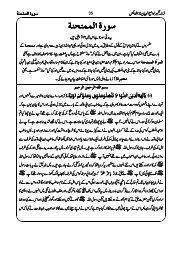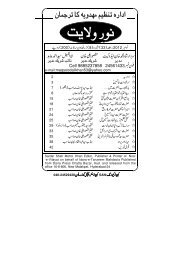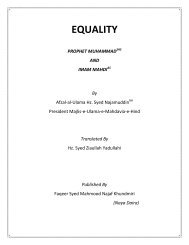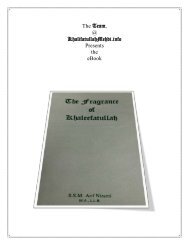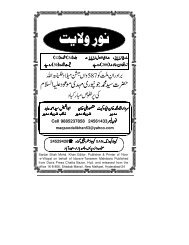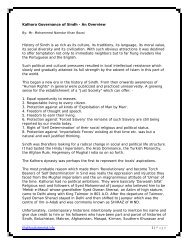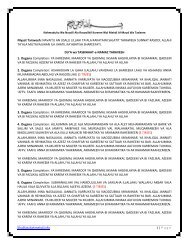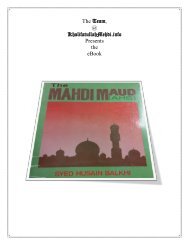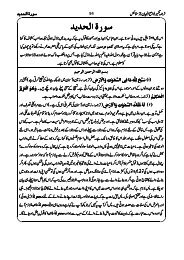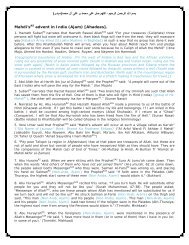Al-Qaul Al-Mahmood - Khalifatullah Mehdi
Al-Qaul Al-Mahmood - Khalifatullah Mehdi
Al-Qaul Al-Mahmood - Khalifatullah Mehdi
Create successful ePaper yourself
Turn your PDF publications into a flip-book with our unique Google optimized e-Paper software.
<strong>Al</strong> <strong>Qaul</strong> <strong>Al</strong> <strong>Mahmood</strong><br />
Hzt Syed <strong>Al</strong>i Yadullahi Makki Badey Miyan RH<br />
Religion consists of the three components: submission (Islam), faith (iman) and beneficence (ihsan).<br />
The first two are related to Prophethood. And Prophet Muhammad SAS preached them to the people. The<br />
third, beneficence (ihsan) was not related to nabuwwat (Prophethood). Besides, it demanded exertion<br />
and hardship. Hence Prophet Muhammad SAS gave out this information as an indirect discourse to his<br />
companions because it was necessary for him to do so. Disseminating information thus does not create<br />
an obligation. Prophet Muhammad SAS delegated the responsibility of preaching beneficence to the<br />
Khatim-e-Vilaya-e-Muhammadi (the seal of the Muhammadan Sainthood). He also gave some clues<br />
about the person who would be assigned the task by <strong>Al</strong>lah. He indicated the Quranic verses and some<br />
clues leading to the identification of the Mahdi AS . He also asked his followers to follow Imam Mahdi AS ,<br />
even if they were compelled to crawl on ice to reach him.<br />
Hence the commandments relating to beneficence were not revealed to the common people<br />
during the period of Prophet Muhammad’s AS companions and their successors. The mujtahideen too did<br />
not concentrate on drawing out the issues from Quranic verses and tradition of the Prophet SAS . Hence, it<br />
is very necessary to explain that these commandments are the commandments of tareeqat (the way of<br />
the sufis). These are also the real issues of Shar’iat for which Imam Mahdi AS was sent on the divine<br />
mission.<br />
Here the relationship between Shar’iat (canonical laws of the Islam) and Haqiqat (Ultimate Reality)<br />
has become obvious. It means that Shar’iat is common and Haqiqat is special, and that the<br />
commandments of Haqiqat are true to the meaning of Shar’iat. Knowledge of causes is required in two<br />
ways: by listening and by information. But is it necessary that every listener should fully know the idiom<br />
and style of speech (to understand the real meaning) It is, therefore, possible that careless conveyors<br />
of the message might err in passing on the correct message to others.<br />
It is for this reason that Imam Mahdi AS has said: “Any saying attributed to me is mine if it is in<br />
accordance with Quran; otherwise, treat it as not from me. It could become incorrect through faulty<br />
reporting.” This shows that if the reporting of an incident is doubtful or does not conform to the norms<br />
described, it is not obligatory as a belief. Anybody who does not abide by the rule is unwise. It has been<br />
explained earlier that Imam Mahdi AS was the perfect follower of the Shar’iat of Prophet Muhammad SAS<br />
and in this capacity; he is the Caliph of the Prophet SAS , as stated by Qazi Muntajibuddin in his book<br />
Makhzan-ud-Dala’il.<br />
This was why Imam Mahdi AS did not explain Shar’iat as dawat (invitation). He has clearly stated that<br />
the mujtahideen had drawn out the Shar’iat issues through the correctness of their opinion. Hence, he<br />
asked his followers to turn to the opinions and fatwas of the mujtahideen. He forbade his followers from<br />
asking him about the Shar’iat commandments because, as he said, he had been sent on the divine<br />
mission to spread the teachings and the hidden divine secrets of vilayat (Muhammadan sainthood), and<br />
that they need not turn to the works of the mujtahideen for these secrets. Imam Mahdi AS would<br />
disseminate the teachings of vilayat because he is the Caliph of <strong>Al</strong>lah, as stated earlier. This is the basic<br />
proof of his Mahdi-ship. And if Imam Mahdi AS is treated as the Caliph of <strong>Al</strong>lah in the matter of Shar’iat,<br />
the question of repeal and rejection of earlier commandments of Shar’iat will rise. When the issue of<br />
naskh (repeal and rejection) raises its head, people will refuse to accept this claim to Mahdi-ship.<br />
Besides, Imam Mahdi AS was not called upon to lay a claim to this. Hence, this is true and all else is<br />
wrong.<br />
It has been reported that Imam Mahdi AS used to repeatedly say that “the commandments of <strong>Al</strong>lah<br />
that I bring to you are faith and religion (deen) and, although Saiyyadain (<strong>Mahmood</strong> and Khundmir) will<br />
<strong>Khalifatullah</strong><strong>Mehdi</strong>.info<br />
38 | P age



